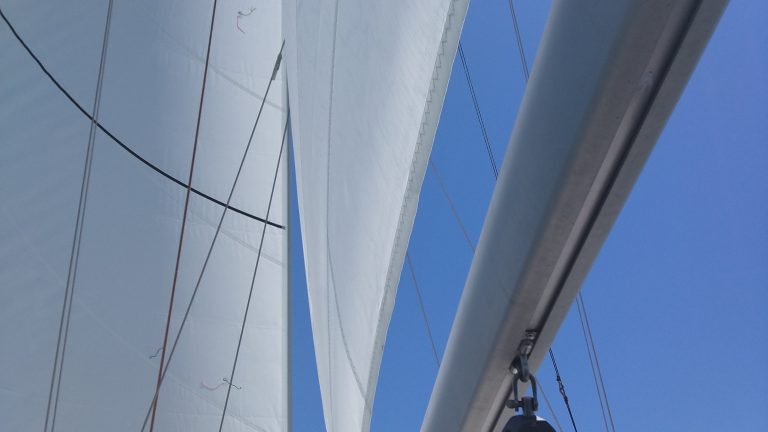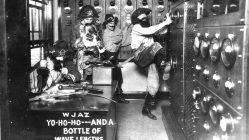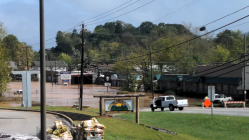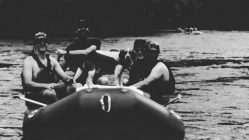To understand the concept of ‘our version’ of a ‘piracy’, one needs to grasp the original reason the Masters of Nassau rebelled and literally laid waste to British shipping lanes.
There is a certain dissatisfaction that men and women of action feel when faced to the mono-culture, cubicalized and cul-de-sac’d world that has become our Modern Era.
We make no bones about the history of Piracy during the Golden age, there wasn’t anything clean cut or pretty about those times – however the motif of a Pirate is pretty accurate for the ideals espoused by the Appalachian Mountain Piracy during it’s infancy in Southern Appalachia. Born in a cultural cauldron of the stubborn mountain born independence hard fought for by the Scots-Irish clans and Eastern Band Cherokee, the men and women of the Piracy perfected their form of ‘radical independence’ on the banks of the French Broad and Nolichucky rivers. Being water born, opposed to the modern collectivism that was gripping Asheville and the region, the Mountain Pirates offered a way a life far different from the well heeled North Eastern half-back or Floridian buying up mountain homes or the tempeh munching Neo-liberal hippie types starting to man the quaint stores owned by the aforementioned newcomers.
The Pirates found themselves more aligned with the older moon-shining families who had previously dominated the mountains, the chrome wielding hog riders dotting along the riverside and the region’s numerous Appalachian trail hikers. Still, the Pirates were in a class of their own. They didn’t belong to any subculture or group, so they formed their own. Within this culture, they formulated philosophies and practices that could guide new members in becoming more uniquely individuated and less of a cog in the system.
Their bread and butter revolved around the Pirates close involvement with the region’s river guides. Underpaid and underappreciated, River Guides held a natural affinity towards the principles espoused by the Piracy. If a river guide was smart enough or proved themselves to be of ‘the right stuff’, the Pirates often encouraged them to ‘float with us’. River rafting was not an easy thing to do, especially on mountain white water where rains could easily turn a hard Class V to an impossible Class VI.
The Mountain Pirates were steeped in Mountain and Coastal folkore, so it was only matter of time that these two steams of folk ideologies came to influence the brothers and sisters in a unique way. With many members holding degrees in science and with more than a few having special experience in military service, they held a distinct advantage over almost every other social group. Not being bound by the traditional shortsightedness that plauged Appalachian culture – they excelled at finding ways to earn a living through both traditional and no-so-traditional methods. Since they held no preconceptions of the region, they weren’t blindsighted to the area’s tribal landscape like so many of the mountain area’s newcomers. Their disdain for local politics allowed them to skirt away from the issues that often quagmired the thinking and lifestyles of the ‘new left’ of Asheville. Combined with their education, experience and near carnie level of psychological understanding of all of the various subgroups that made up Appalachia, the Mountain Pirates did what they could do best; make money, have fun and get way from everyone else.
The Piracy was, and still is, an active rejection of the misapplied cultural modernization that is gripping such areas as Portland, Mount Shasta and Asheville. At one time, these regions held such promise for growth, independence and vitality. However, deep gentrification, monied transplants and idealistic politics destroyed nearly all of the organic home spun goodness that previously defined these areas.
As time went on, the Mountain Piracy was forced to ‘grow up’ and define it’s self more by what it was actually for and not so much what it was against. The concept of the Competent Man, which many post-modern New York City bound coffee shop writers have dismissed as a fantasy, was achievable. Competency required a healthy notion of responsibility, self worth and a sense of humor about life. Responsibility diminishes the further one gets way from nature and plunges more into the unbanesque hive mind of any cosmopolitan landscape. If anything, the world needed more polymaths/polyglots, generalists and competent people – not less. It was within this notion that the Mountain Pirates found their cause … and it guides our philosophy to this day.
A human being should be able to change a diaper, plan an invasion, butcher a hog, conn a ship, design a building, write a sonnet, balance accounts, build a wall, set a bone, comfort the dying, take orders, give orders, cooperate, act alone, solve equations, analyse a new problem, pitch manure, program a computer, cook a tasty meal, fight efficiently, die gallantly. Specialization is for insects.





